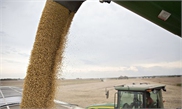COMMENTS / EXPERT ASSESSMENT
Global soybean markets face major virus uncertainty

Illustration: Luo Xuan/GT
With the spread of the COVID-19 pandemic, global food supply and distribution have been affected to a certain extent. For China, due to its high staple food self-sufficiency rate and grain reserves, there will not be too many problems in the short term. However, China's soybeans have long relied on imports. The development of the pandemic in major soybean-producing areas around the world, trade policies, political factors and the cancellation of policies will seriously affect international soybean circulation and the international soybean market, which in turn will affect China's soybean supply.South America is the main producer of soybeans, accounting for 56 percent of the world's total output, of which Brazil's soybean output is 36 percent, Argentina's 15.7 percent, Paraguay's 3 percent, Bolivia's 0.8 percent, and Uruguay's 0.6 percent. Brazil's soybean exports account for 50 percent of the total trade volume, Argentina's soybean meal exports account for 45 percent of total exports, and soybean oil exports account for 50 percent of total exports. The new COVID-19 pandemic has had great impact on soybean prices. As China's soybean imports account for 60 percent of the global soybean trade, the reduction in Chinese demand during the first quarter has affected soybean prices. From mid-March, the recovery of China's domestic economic activity has caused the market to return to regular prices.
What are larger South American countries doing to contain COVID-19? How will these policies affect soybean supply?
The Argentinian government's attitude is very clear, Argentinian President Alberto Fernandez said: "Between economy and life, I choose life," according to media reports. After the coronavirus spread, the government declared a state of health emergency, closed schools, canceled flights, closed territorial borders, and canceled public activities.
On the opposite side, Brazilian President Jair Bolsonaro and US President Donald Trump have shown striking agreement. Bolsonaro has repeatedly downplayed the potential risks of the pandemic. He halted a segregation control policy proposed by some domestic governors and launched a "Brazil can't stop" campaign.
Similar to Argentina, Brazil 's soybean production is also highly mechanized. The pandemic has had little impact on domestic production, and the main issues are in transportation and logistics. At present, 47 percent of Brazil's cereals (corn and soybeans) reach the port by rail, 42 percent by road, and 11 percent by water. In the early stages of the pandemic, Brazil had relatively looser controls on cargo transportation compared to Argentina, but it has not ruled out increased isolation control in the future, further exacerbating the difficulty of soybean transportation. A lack of communication between government levels or an escalation in the coronavirus crisis could affect logistics.
The two main soybean producing countries, Argentina and Brazil, have had very different policies in response to the pandemic. In Argentina, the government hopes to control the spread of the virus through strong isolation control measures. Various political factions are working together to implement key policies and the government needs and wants to promote exports. Brazil faces a more complicated situation. No one knows exactly what will happen as there is no political consensus among leaders and governments at all levels. But what is certain is that for its soybean market and exports, and for the global economy, there are considerable uncertainties in the future.
Lu Jie is a professor at the Renmin University of China. Maria Haro Sly is an Argentinian scholar at the Renmin University of China. bizopinion@globaltimes.com.cn

